Report on Developing Individuals, Teams, and Organisations, Whirlpool
VerifiedAdded on 2020/12/18
|19
|6457
|195
Report
AI Summary
This report examines the crucial aspects of developing individuals, teams, and organizations, focusing on the context of Whirlpool. It begins by identifying the essential knowledge, skills, and behaviors required by HR professionals, including areas such as HR management, trend analysis, technical expertise, and change management. The report then delves into personal skills audits, detailing how these audits assess individual strengths and weaknesses to inform the creation of personalized professional development plans. It highlights the differences between organizational and individual learning, training, and development, incorporating the learning cycle theory to emphasize continuous professional development. Furthermore, the report explores how high-performance working contributes to employee engagement and competitive advantage, followed by a discussion of various performance management approaches that support a high-performance culture and commitment within the organization. The report concludes by synthesizing the key findings and implications for effective organizational development within Whirlpool.
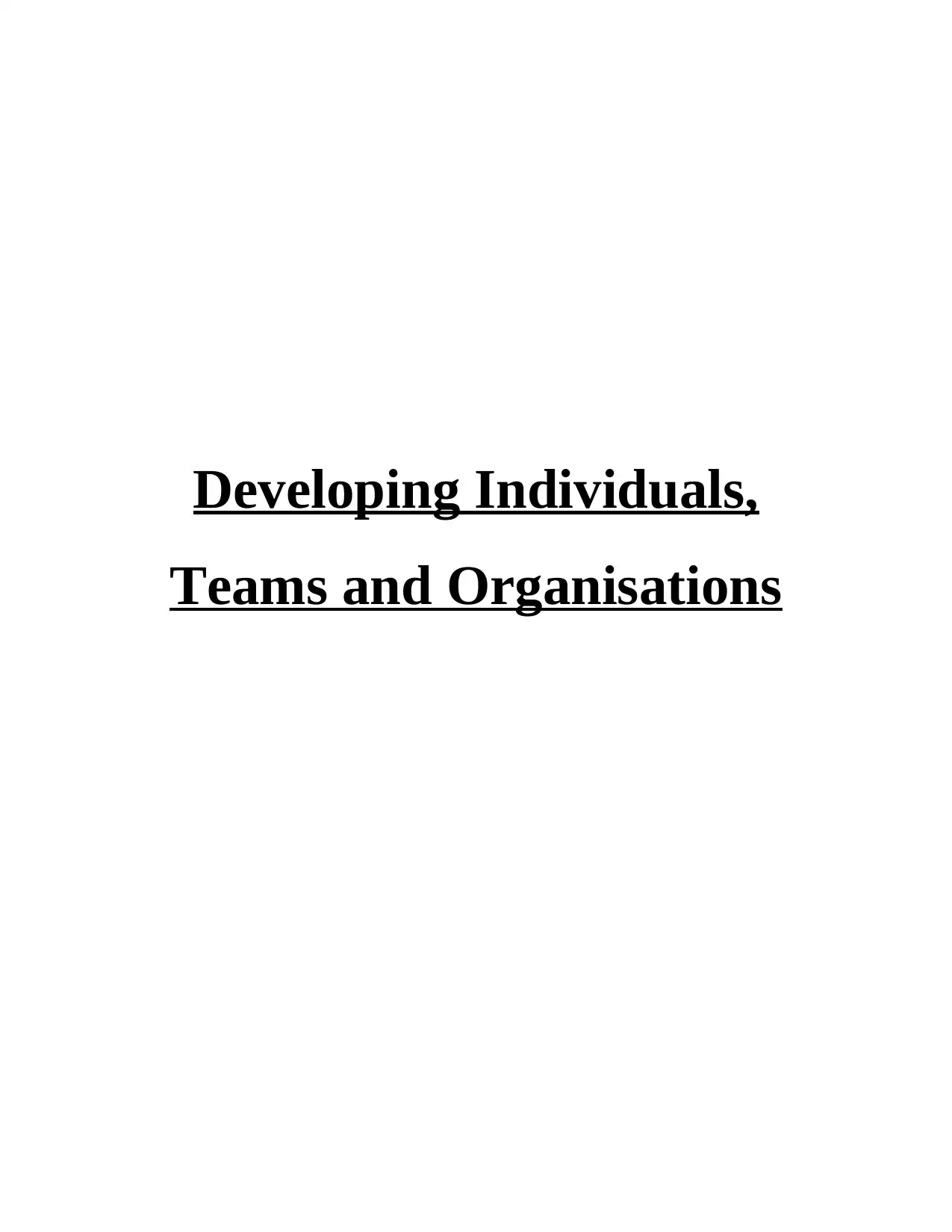
Developing Individuals,
Teams and Organisations
Teams and Organisations
Paraphrase This Document
Need a fresh take? Get an instant paraphrase of this document with our AI Paraphraser
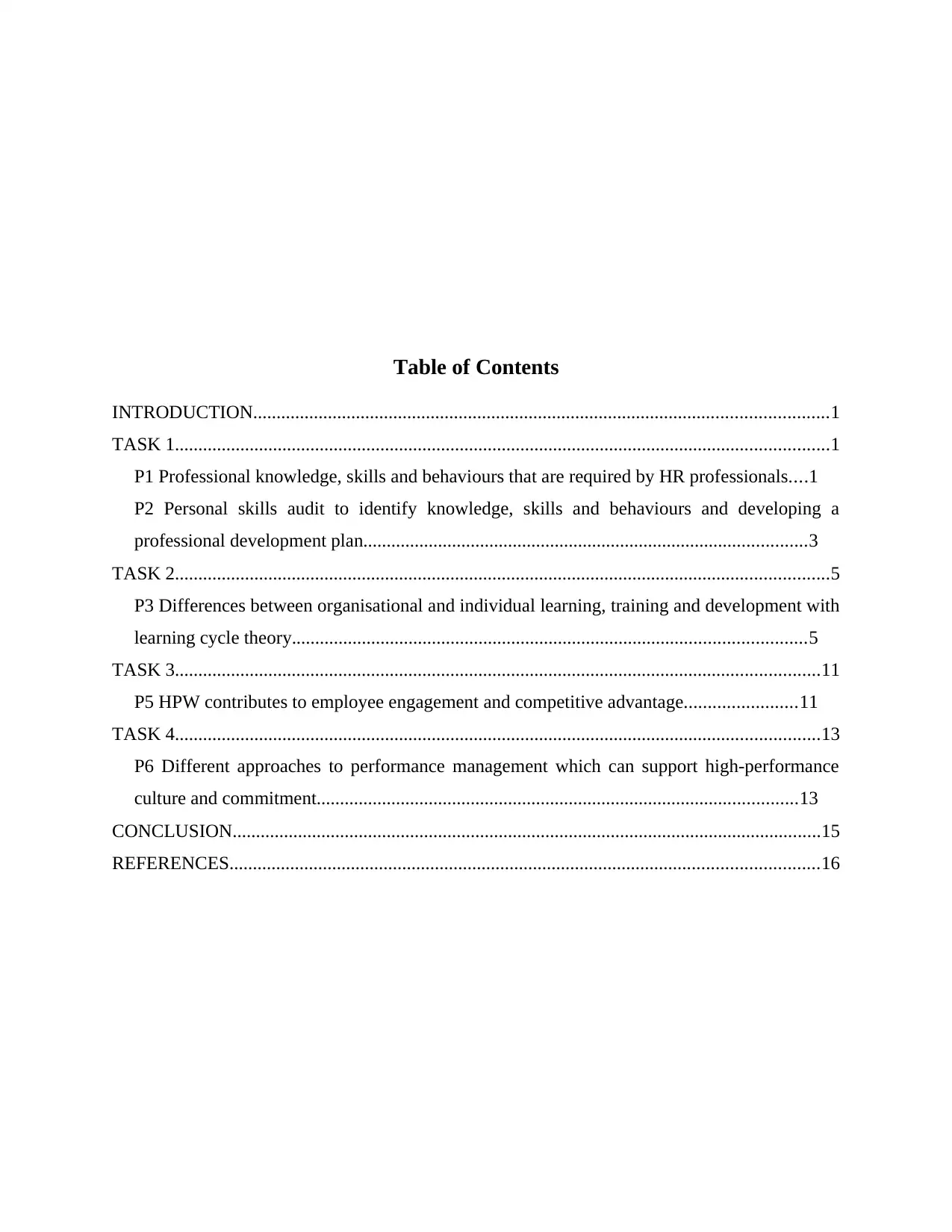
Table of Contents
INTRODUCTION...........................................................................................................................1
TASK 1............................................................................................................................................1
P1 Professional knowledge, skills and behaviours that are required by HR professionals....1
P2 Personal skills audit to identify knowledge, skills and behaviours and developing a
professional development plan...............................................................................................3
TASK 2............................................................................................................................................5
P3 Differences between organisational and individual learning, training and development with
learning cycle theory..............................................................................................................5
TASK 3..........................................................................................................................................11
P5 HPW contributes to employee engagement and competitive advantage........................11
TASK 4..........................................................................................................................................13
P6 Different approaches to performance management which can support high-performance
culture and commitment.......................................................................................................13
CONCLUSION..............................................................................................................................15
REFERENCES..............................................................................................................................16
INTRODUCTION...........................................................................................................................1
TASK 1............................................................................................................................................1
P1 Professional knowledge, skills and behaviours that are required by HR professionals....1
P2 Personal skills audit to identify knowledge, skills and behaviours and developing a
professional development plan...............................................................................................3
TASK 2............................................................................................................................................5
P3 Differences between organisational and individual learning, training and development with
learning cycle theory..............................................................................................................5
TASK 3..........................................................................................................................................11
P5 HPW contributes to employee engagement and competitive advantage........................11
TASK 4..........................................................................................................................................13
P6 Different approaches to performance management which can support high-performance
culture and commitment.......................................................................................................13
CONCLUSION..............................................................................................................................15
REFERENCES..............................................................................................................................16
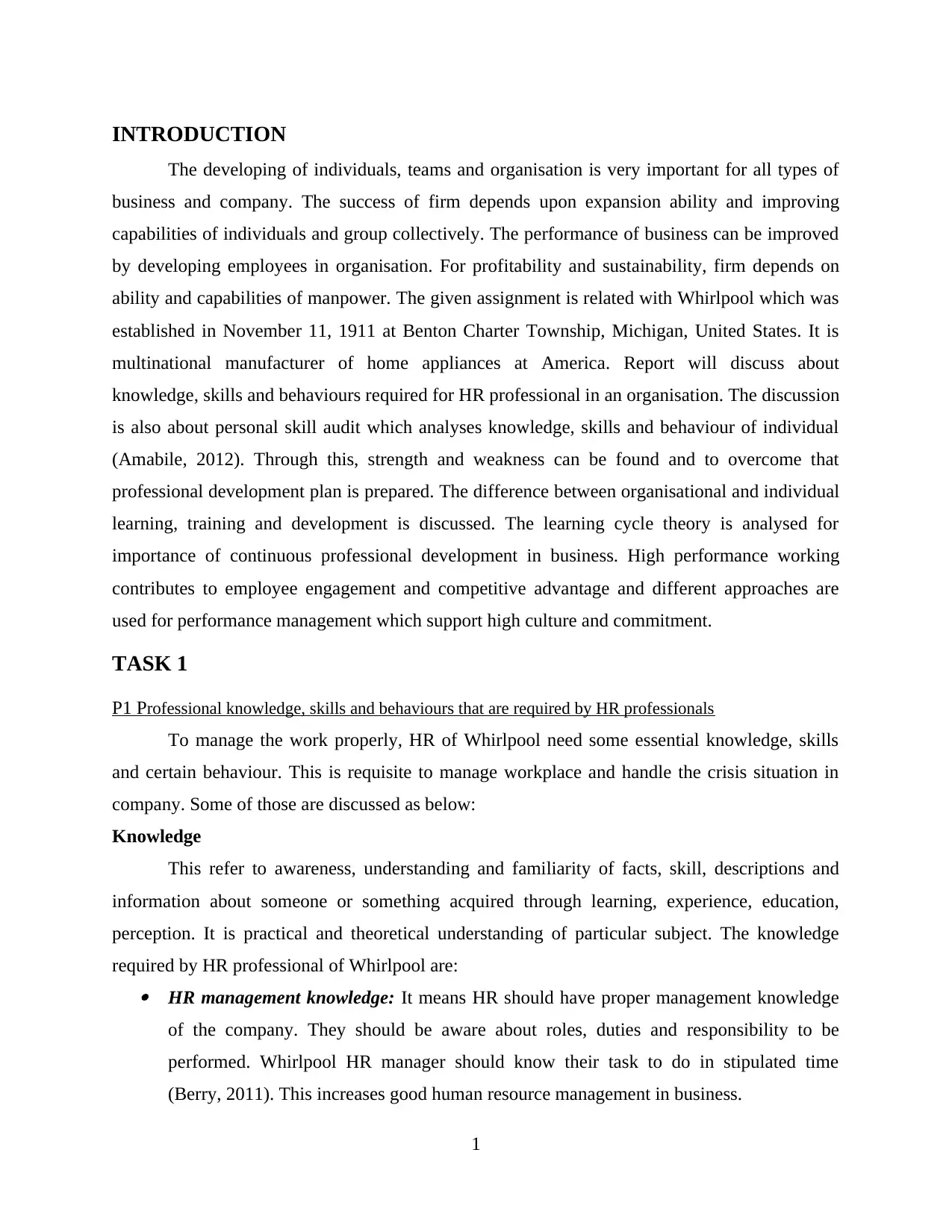
INTRODUCTION
The developing of individuals, teams and organisation is very important for all types of
business and company. The success of firm depends upon expansion ability and improving
capabilities of individuals and group collectively. The performance of business can be improved
by developing employees in organisation. For profitability and sustainability, firm depends on
ability and capabilities of manpower. The given assignment is related with Whirlpool which was
established in November 11, 1911 at Benton Charter Township, Michigan, United States. It is
multinational manufacturer of home appliances at America. Report will discuss about
knowledge, skills and behaviours required for HR professional in an organisation. The discussion
is also about personal skill audit which analyses knowledge, skills and behaviour of individual
(Amabile, 2012). Through this, strength and weakness can be found and to overcome that
professional development plan is prepared. The difference between organisational and individual
learning, training and development is discussed. The learning cycle theory is analysed for
importance of continuous professional development in business. High performance working
contributes to employee engagement and competitive advantage and different approaches are
used for performance management which support high culture and commitment.
TASK 1
P1 Professional knowledge, skills and behaviours that are required by HR professionals
To manage the work properly, HR of Whirlpool need some essential knowledge, skills
and certain behaviour. This is requisite to manage workplace and handle the crisis situation in
company. Some of those are discussed as below:
Knowledge
This refer to awareness, understanding and familiarity of facts, skill, descriptions and
information about someone or something acquired through learning, experience, education,
perception. It is practical and theoretical understanding of particular subject. The knowledge
required by HR professional of Whirlpool are: HR management knowledge: It means HR should have proper management knowledge
of the company. They should be aware about roles, duties and responsibility to be
performed. Whirlpool HR manager should know their task to do in stipulated time
(Berry, 2011). This increases good human resource management in business.
1
The developing of individuals, teams and organisation is very important for all types of
business and company. The success of firm depends upon expansion ability and improving
capabilities of individuals and group collectively. The performance of business can be improved
by developing employees in organisation. For profitability and sustainability, firm depends on
ability and capabilities of manpower. The given assignment is related with Whirlpool which was
established in November 11, 1911 at Benton Charter Township, Michigan, United States. It is
multinational manufacturer of home appliances at America. Report will discuss about
knowledge, skills and behaviours required for HR professional in an organisation. The discussion
is also about personal skill audit which analyses knowledge, skills and behaviour of individual
(Amabile, 2012). Through this, strength and weakness can be found and to overcome that
professional development plan is prepared. The difference between organisational and individual
learning, training and development is discussed. The learning cycle theory is analysed for
importance of continuous professional development in business. High performance working
contributes to employee engagement and competitive advantage and different approaches are
used for performance management which support high culture and commitment.
TASK 1
P1 Professional knowledge, skills and behaviours that are required by HR professionals
To manage the work properly, HR of Whirlpool need some essential knowledge, skills
and certain behaviour. This is requisite to manage workplace and handle the crisis situation in
company. Some of those are discussed as below:
Knowledge
This refer to awareness, understanding and familiarity of facts, skill, descriptions and
information about someone or something acquired through learning, experience, education,
perception. It is practical and theoretical understanding of particular subject. The knowledge
required by HR professional of Whirlpool are: HR management knowledge: It means HR should have proper management knowledge
of the company. They should be aware about roles, duties and responsibility to be
performed. Whirlpool HR manager should know their task to do in stipulated time
(Berry, 2011). This increases good human resource management in business.
1
⊘ This is a preview!⊘
Do you want full access?
Subscribe today to unlock all pages.

Trusted by 1+ million students worldwide
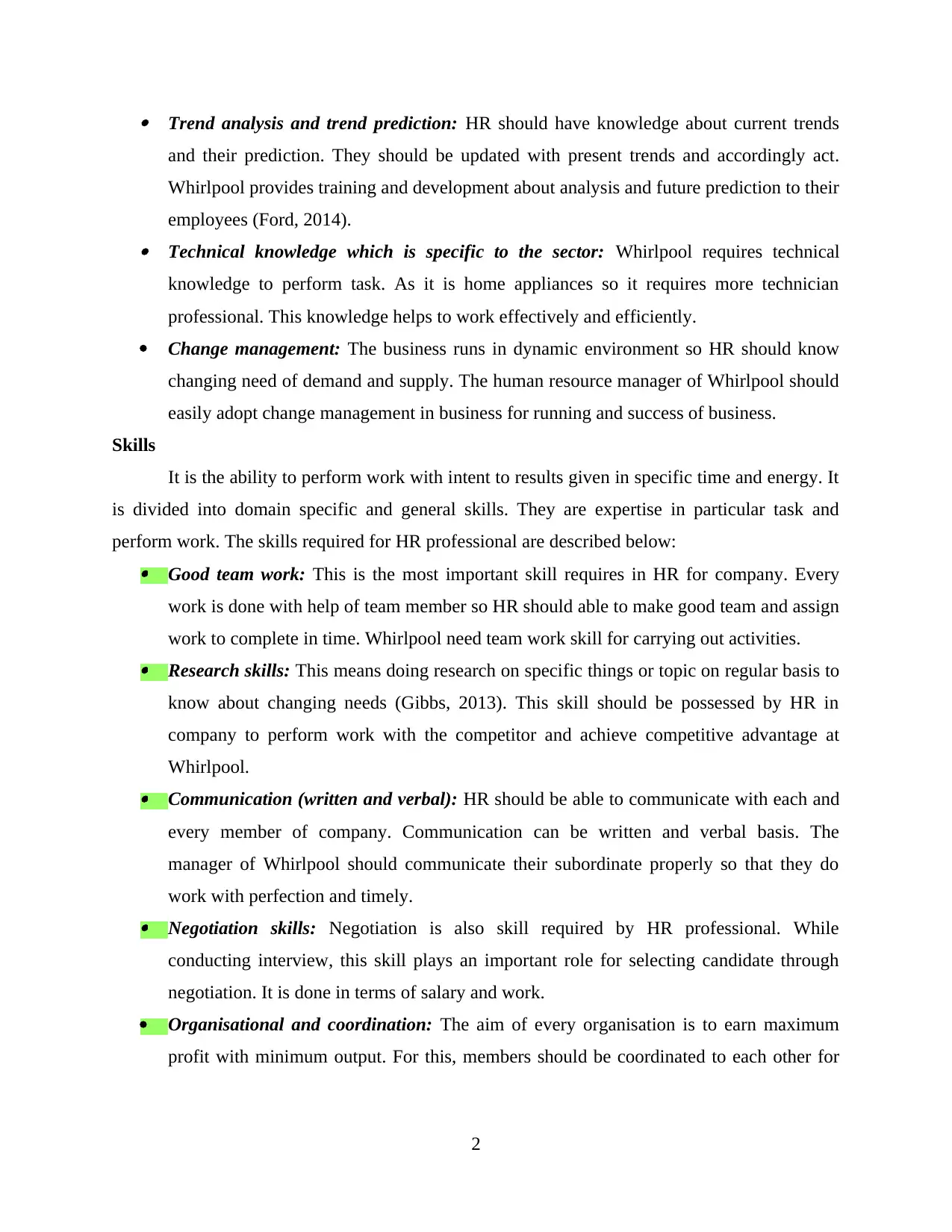
Trend analysis and trend prediction: HR should have knowledge about current trends
and their prediction. They should be updated with present trends and accordingly act.
Whirlpool provides training and development about analysis and future prediction to their
employees (Ford, 2014). Technical knowledge which is specific to the sector: Whirlpool requires technical
knowledge to perform task. As it is home appliances so it requires more technician
professional. This knowledge helps to work effectively and efficiently.
Change management: The business runs in dynamic environment so HR should know
changing need of demand and supply. The human resource manager of Whirlpool should
easily adopt change management in business for running and success of business.
Skills
It is the ability to perform work with intent to results given in specific time and energy. It
is divided into domain specific and general skills. They are expertise in particular task and
perform work. The skills required for HR professional are described below: Good team work: This is the most important skill requires in HR for company. Every
work is done with help of team member so HR should able to make good team and assign
work to complete in time. Whirlpool need team work skill for carrying out activities. Research skills: This means doing research on specific things or topic on regular basis to
know about changing needs (Gibbs, 2013). This skill should be possessed by HR in
company to perform work with the competitor and achieve competitive advantage at
Whirlpool. Communication (written and verbal): HR should be able to communicate with each and
every member of company. Communication can be written and verbal basis. The
manager of Whirlpool should communicate their subordinate properly so that they do
work with perfection and timely. Negotiation skills: Negotiation is also skill required by HR professional. While
conducting interview, this skill plays an important role for selecting candidate through
negotiation. It is done in terms of salary and work.
Organisational and coordination: The aim of every organisation is to earn maximum
profit with minimum output. For this, members should be coordinated to each other for
2
and their prediction. They should be updated with present trends and accordingly act.
Whirlpool provides training and development about analysis and future prediction to their
employees (Ford, 2014). Technical knowledge which is specific to the sector: Whirlpool requires technical
knowledge to perform task. As it is home appliances so it requires more technician
professional. This knowledge helps to work effectively and efficiently.
Change management: The business runs in dynamic environment so HR should know
changing need of demand and supply. The human resource manager of Whirlpool should
easily adopt change management in business for running and success of business.
Skills
It is the ability to perform work with intent to results given in specific time and energy. It
is divided into domain specific and general skills. They are expertise in particular task and
perform work. The skills required for HR professional are described below: Good team work: This is the most important skill requires in HR for company. Every
work is done with help of team member so HR should able to make good team and assign
work to complete in time. Whirlpool need team work skill for carrying out activities. Research skills: This means doing research on specific things or topic on regular basis to
know about changing needs (Gibbs, 2013). This skill should be possessed by HR in
company to perform work with the competitor and achieve competitive advantage at
Whirlpool. Communication (written and verbal): HR should be able to communicate with each and
every member of company. Communication can be written and verbal basis. The
manager of Whirlpool should communicate their subordinate properly so that they do
work with perfection and timely. Negotiation skills: Negotiation is also skill required by HR professional. While
conducting interview, this skill plays an important role for selecting candidate through
negotiation. It is done in terms of salary and work.
Organisational and coordination: The aim of every organisation is to earn maximum
profit with minimum output. For this, members should be coordinated to each other for
2
Paraphrase This Document
Need a fresh take? Get an instant paraphrase of this document with our AI Paraphraser
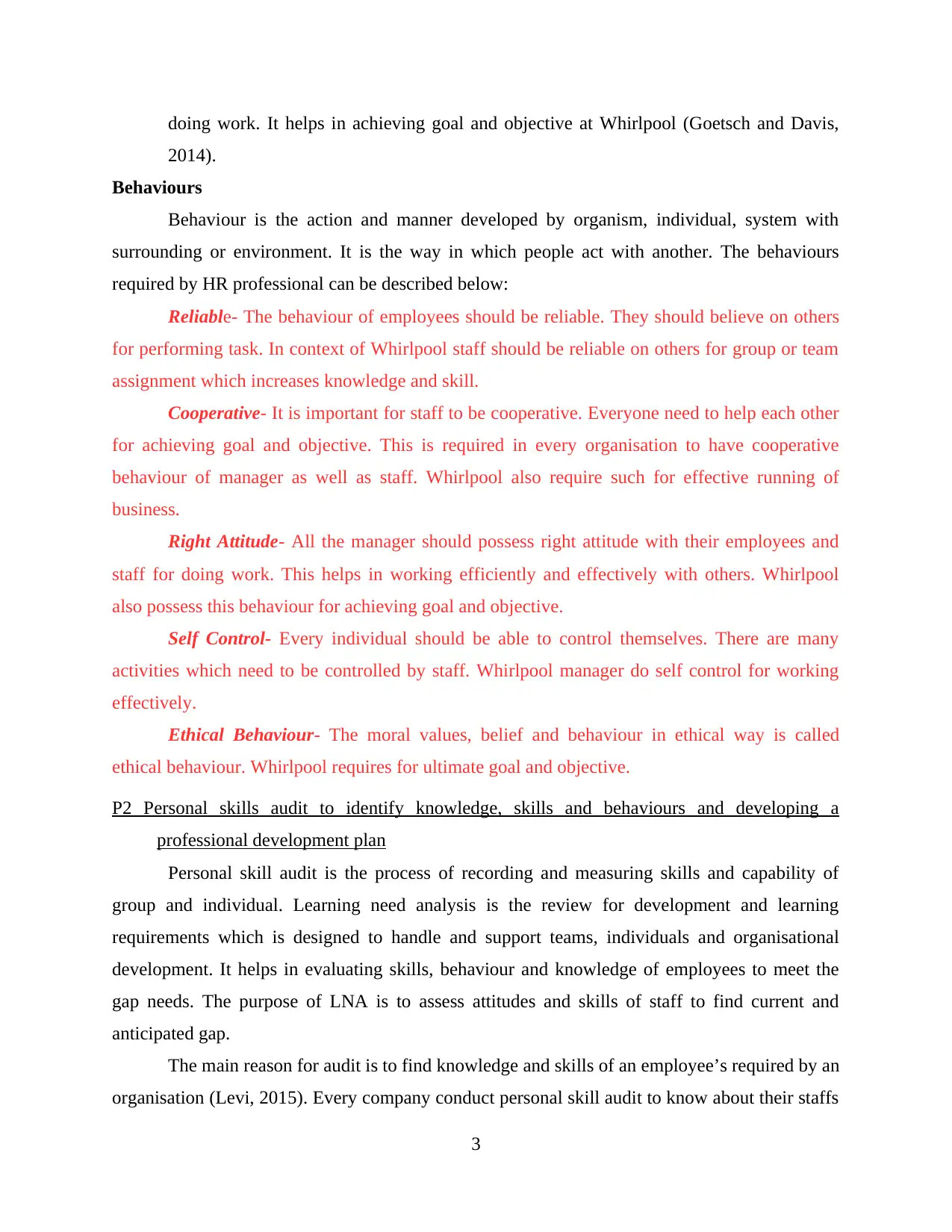
doing work. It helps in achieving goal and objective at Whirlpool (Goetsch and Davis,
2014).
Behaviours
Behaviour is the action and manner developed by organism, individual, system with
surrounding or environment. It is the way in which people act with another. The behaviours
required by HR professional can be described below:
Reliable- The behaviour of employees should be reliable. They should believe on others
for performing task. In context of Whirlpool staff should be reliable on others for group or team
assignment which increases knowledge and skill.
Cooperative- It is important for staff to be cooperative. Everyone need to help each other
for achieving goal and objective. This is required in every organisation to have cooperative
behaviour of manager as well as staff. Whirlpool also require such for effective running of
business.
Right Attitude- All the manager should possess right attitude with their employees and
staff for doing work. This helps in working efficiently and effectively with others. Whirlpool
also possess this behaviour for achieving goal and objective.
Self Control- Every individual should be able to control themselves. There are many
activities which need to be controlled by staff. Whirlpool manager do self control for working
effectively.
Ethical Behaviour- The moral values, belief and behaviour in ethical way is called
ethical behaviour. Whirlpool requires for ultimate goal and objective.
P2 Personal skills audit to identify knowledge, skills and behaviours and developing a
professional development plan
Personal skill audit is the process of recording and measuring skills and capability of
group and individual. Learning need analysis is the review for development and learning
requirements which is designed to handle and support teams, individuals and organisational
development. It helps in evaluating skills, behaviour and knowledge of employees to meet the
gap needs. The purpose of LNA is to assess attitudes and skills of staff to find current and
anticipated gap.
The main reason for audit is to find knowledge and skills of an employee’s required by an
organisation (Levi, 2015). Every company conduct personal skill audit to know about their staffs
3
2014).
Behaviours
Behaviour is the action and manner developed by organism, individual, system with
surrounding or environment. It is the way in which people act with another. The behaviours
required by HR professional can be described below:
Reliable- The behaviour of employees should be reliable. They should believe on others
for performing task. In context of Whirlpool staff should be reliable on others for group or team
assignment which increases knowledge and skill.
Cooperative- It is important for staff to be cooperative. Everyone need to help each other
for achieving goal and objective. This is required in every organisation to have cooperative
behaviour of manager as well as staff. Whirlpool also require such for effective running of
business.
Right Attitude- All the manager should possess right attitude with their employees and
staff for doing work. This helps in working efficiently and effectively with others. Whirlpool
also possess this behaviour for achieving goal and objective.
Self Control- Every individual should be able to control themselves. There are many
activities which need to be controlled by staff. Whirlpool manager do self control for working
effectively.
Ethical Behaviour- The moral values, belief and behaviour in ethical way is called
ethical behaviour. Whirlpool requires for ultimate goal and objective.
P2 Personal skills audit to identify knowledge, skills and behaviours and developing a
professional development plan
Personal skill audit is the process of recording and measuring skills and capability of
group and individual. Learning need analysis is the review for development and learning
requirements which is designed to handle and support teams, individuals and organisational
development. It helps in evaluating skills, behaviour and knowledge of employees to meet the
gap needs. The purpose of LNA is to assess attitudes and skills of staff to find current and
anticipated gap.
The main reason for audit is to find knowledge and skills of an employee’s required by an
organisation (Levi, 2015). Every company conduct personal skill audit to know about their staffs
3
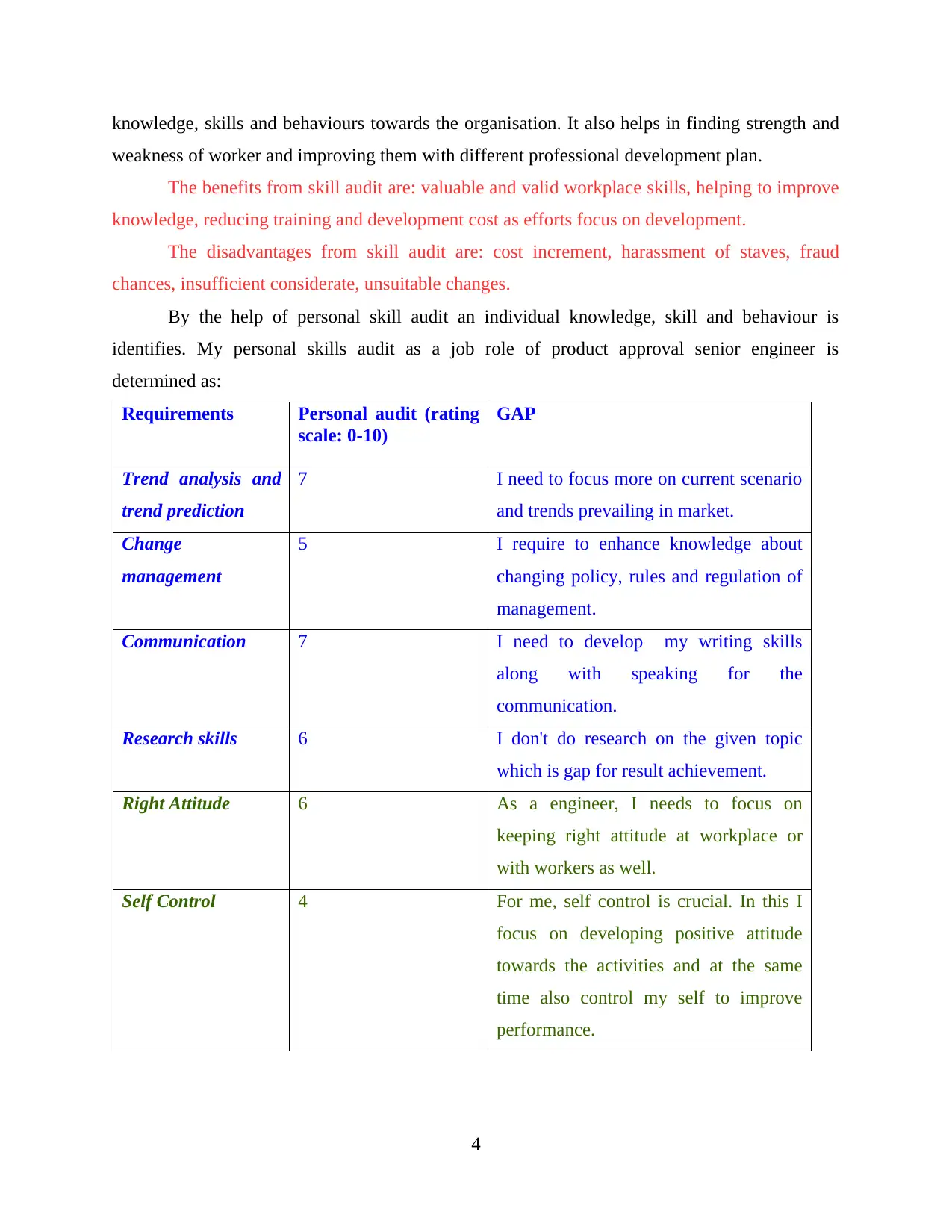
knowledge, skills and behaviours towards the organisation. It also helps in finding strength and
weakness of worker and improving them with different professional development plan.
The benefits from skill audit are: valuable and valid workplace skills, helping to improve
knowledge, reducing training and development cost as efforts focus on development.
The disadvantages from skill audit are: cost increment, harassment of staves, fraud
chances, insufficient considerate, unsuitable changes.
By the help of personal skill audit an individual knowledge, skill and behaviour is
identifies. My personal skills audit as a job role of product approval senior engineer is
determined as:
Requirements Personal audit (rating
scale: 0-10)
GAP
Trend analysis and
trend prediction
7 I need to focus more on current scenario
and trends prevailing in market.
Change
management
5 I require to enhance knowledge about
changing policy, rules and regulation of
management.
Communication 7 I need to develop my writing skills
along with speaking for the
communication.
Research skills 6 I don't do research on the given topic
which is gap for result achievement.
Right Attitude 6 As a engineer, I needs to focus on
keeping right attitude at workplace or
with workers as well.
Self Control 4 For me, self control is crucial. In this I
focus on developing positive attitude
towards the activities and at the same
time also control my self to improve
performance.
4
weakness of worker and improving them with different professional development plan.
The benefits from skill audit are: valuable and valid workplace skills, helping to improve
knowledge, reducing training and development cost as efforts focus on development.
The disadvantages from skill audit are: cost increment, harassment of staves, fraud
chances, insufficient considerate, unsuitable changes.
By the help of personal skill audit an individual knowledge, skill and behaviour is
identifies. My personal skills audit as a job role of product approval senior engineer is
determined as:
Requirements Personal audit (rating
scale: 0-10)
GAP
Trend analysis and
trend prediction
7 I need to focus more on current scenario
and trends prevailing in market.
Change
management
5 I require to enhance knowledge about
changing policy, rules and regulation of
management.
Communication 7 I need to develop my writing skills
along with speaking for the
communication.
Research skills 6 I don't do research on the given topic
which is gap for result achievement.
Right Attitude 6 As a engineer, I needs to focus on
keeping right attitude at workplace or
with workers as well.
Self Control 4 For me, self control is crucial. In this I
focus on developing positive attitude
towards the activities and at the same
time also control my self to improve
performance.
4
⊘ This is a preview!⊘
Do you want full access?
Subscribe today to unlock all pages.

Trusted by 1+ million students worldwide
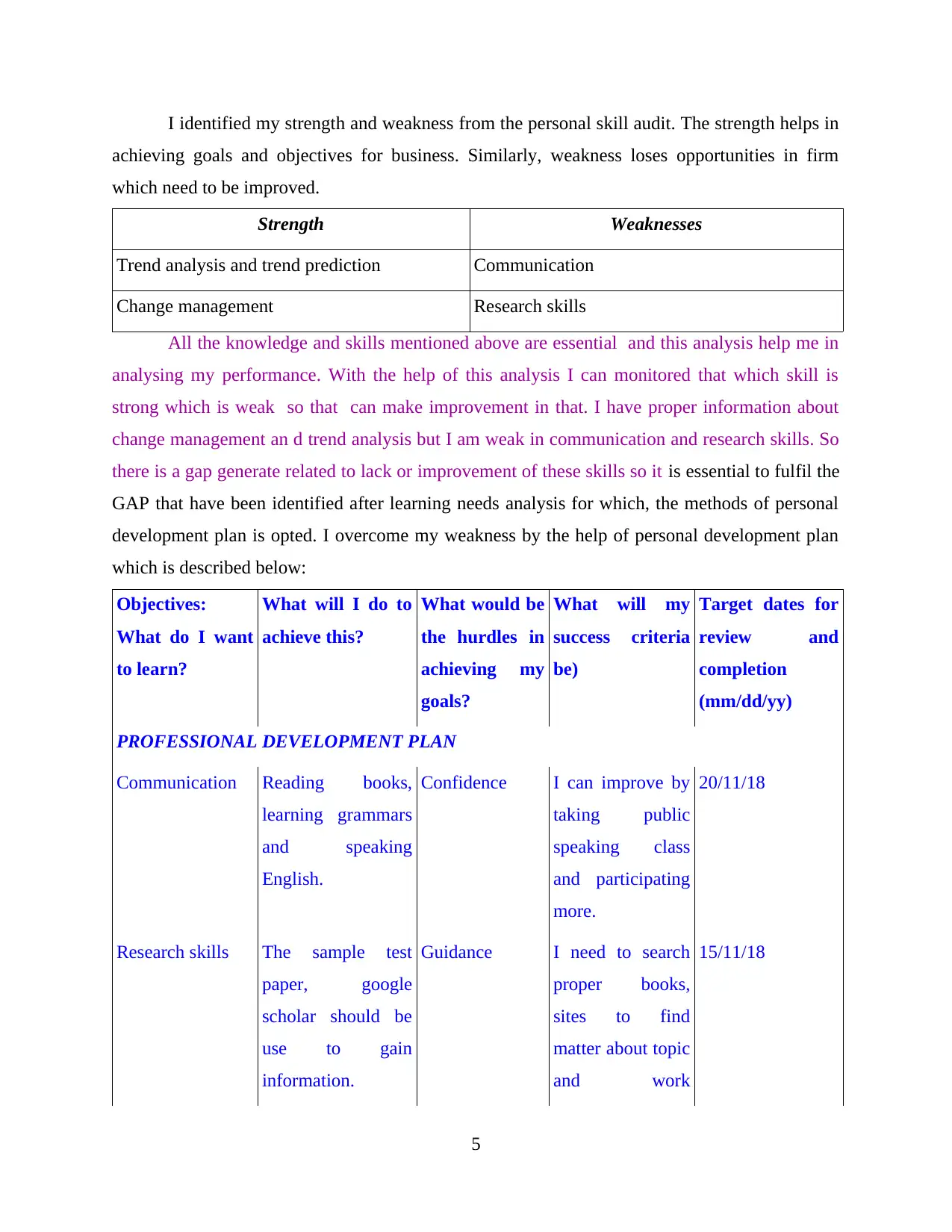
I identified my strength and weakness from the personal skill audit. The strength helps in
achieving goals and objectives for business. Similarly, weakness loses opportunities in firm
which need to be improved.
Strength Weaknesses
Trend analysis and trend prediction Communication
Change management Research skills
All the knowledge and skills mentioned above are essential and this analysis help me in
analysing my performance. With the help of this analysis I can monitored that which skill is
strong which is weak so that can make improvement in that. I have proper information about
change management an d trend analysis but I am weak in communication and research skills. So
there is a gap generate related to lack or improvement of these skills so it is essential to fulfil the
GAP that have been identified after learning needs analysis for which, the methods of personal
development plan is opted. I overcome my weakness by the help of personal development plan
which is described below:
Objectives:
What do I want
to learn?
What will I do to
achieve this?
What would be
the hurdles in
achieving my
goals?
What will my
success criteria
be)
Target dates for
review and
completion
(mm/dd/yy)
PROFESSIONAL DEVELOPMENT PLAN
Communication Reading books,
learning grammars
and speaking
English.
Confidence I can improve by
taking public
speaking class
and participating
more.
20/11/18
Research skills The sample test
paper, google
scholar should be
use to gain
information.
Guidance I need to search
proper books,
sites to find
matter about topic
and work
15/11/18
5
achieving goals and objectives for business. Similarly, weakness loses opportunities in firm
which need to be improved.
Strength Weaknesses
Trend analysis and trend prediction Communication
Change management Research skills
All the knowledge and skills mentioned above are essential and this analysis help me in
analysing my performance. With the help of this analysis I can monitored that which skill is
strong which is weak so that can make improvement in that. I have proper information about
change management an d trend analysis but I am weak in communication and research skills. So
there is a gap generate related to lack or improvement of these skills so it is essential to fulfil the
GAP that have been identified after learning needs analysis for which, the methods of personal
development plan is opted. I overcome my weakness by the help of personal development plan
which is described below:
Objectives:
What do I want
to learn?
What will I do to
achieve this?
What would be
the hurdles in
achieving my
goals?
What will my
success criteria
be)
Target dates for
review and
completion
(mm/dd/yy)
PROFESSIONAL DEVELOPMENT PLAN
Communication Reading books,
learning grammars
and speaking
English.
Confidence I can improve by
taking public
speaking class
and participating
more.
20/11/18
Research skills The sample test
paper, google
scholar should be
use to gain
information.
Guidance I need to search
proper books,
sites to find
matter about topic
and work
15/11/18
5
Paraphrase This Document
Need a fresh take? Get an instant paraphrase of this document with our AI Paraphraser
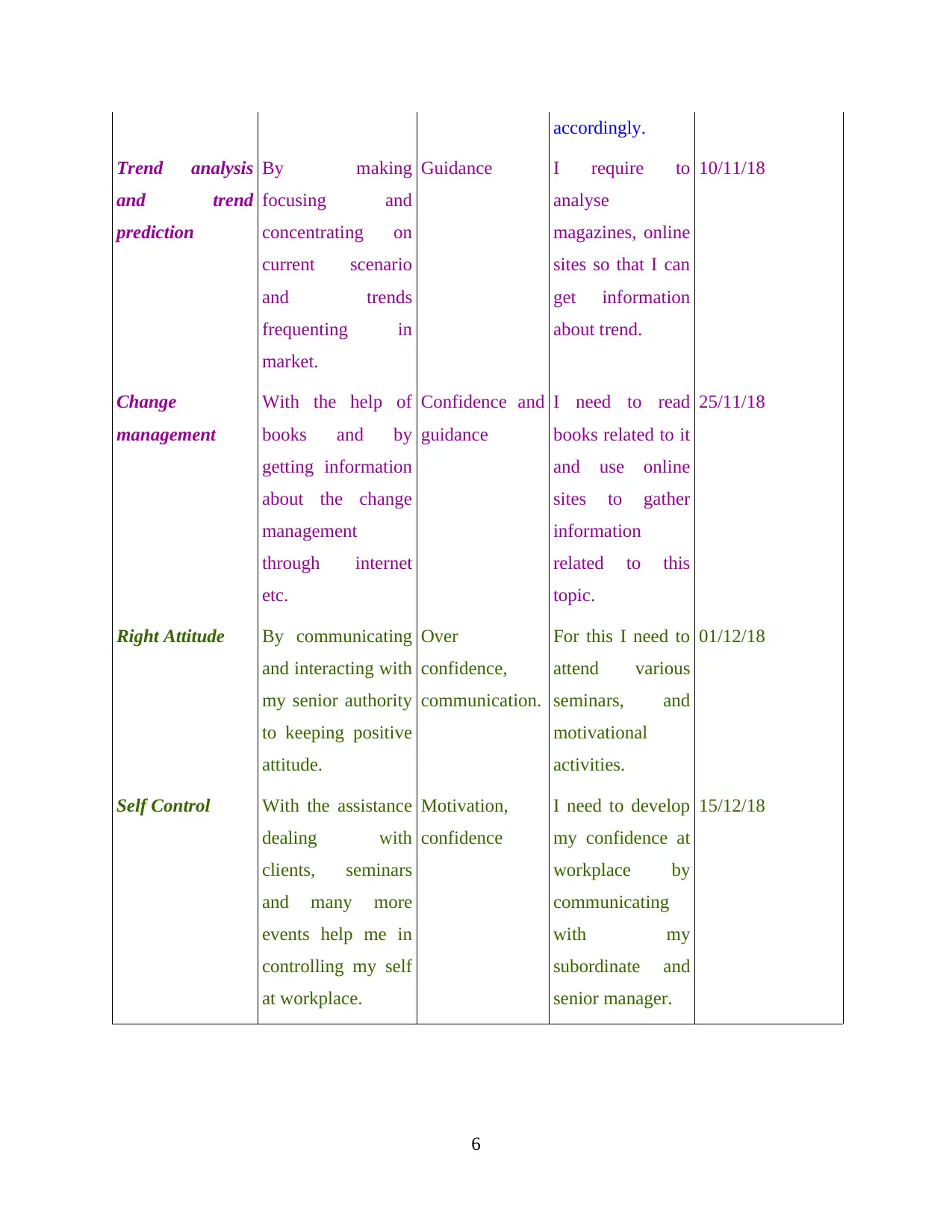
accordingly.
Trend analysis
and trend
prediction
By making
focusing and
concentrating on
current scenario
and trends
frequenting in
market.
Guidance I require to
analyse
magazines, online
sites so that I can
get information
about trend.
10/11/18
Change
management
With the help of
books and by
getting information
about the change
management
through internet
etc.
Confidence and
guidance
I need to read
books related to it
and use online
sites to gather
information
related to this
topic.
25/11/18
Right Attitude By communicating
and interacting with
my senior authority
to keeping positive
attitude.
Over
confidence,
communication.
For this I need to
attend various
seminars, and
motivational
activities.
01/12/18
Self Control With the assistance
dealing with
clients, seminars
and many more
events help me in
controlling my self
at workplace.
Motivation,
confidence
I need to develop
my confidence at
workplace by
communicating
with my
subordinate and
senior manager.
15/12/18
6
Trend analysis
and trend
prediction
By making
focusing and
concentrating on
current scenario
and trends
frequenting in
market.
Guidance I require to
analyse
magazines, online
sites so that I can
get information
about trend.
10/11/18
Change
management
With the help of
books and by
getting information
about the change
management
through internet
etc.
Confidence and
guidance
I need to read
books related to it
and use online
sites to gather
information
related to this
topic.
25/11/18
Right Attitude By communicating
and interacting with
my senior authority
to keeping positive
attitude.
Over
confidence,
communication.
For this I need to
attend various
seminars, and
motivational
activities.
01/12/18
Self Control With the assistance
dealing with
clients, seminars
and many more
events help me in
controlling my self
at workplace.
Motivation,
confidence
I need to develop
my confidence at
workplace by
communicating
with my
subordinate and
senior manager.
15/12/18
6
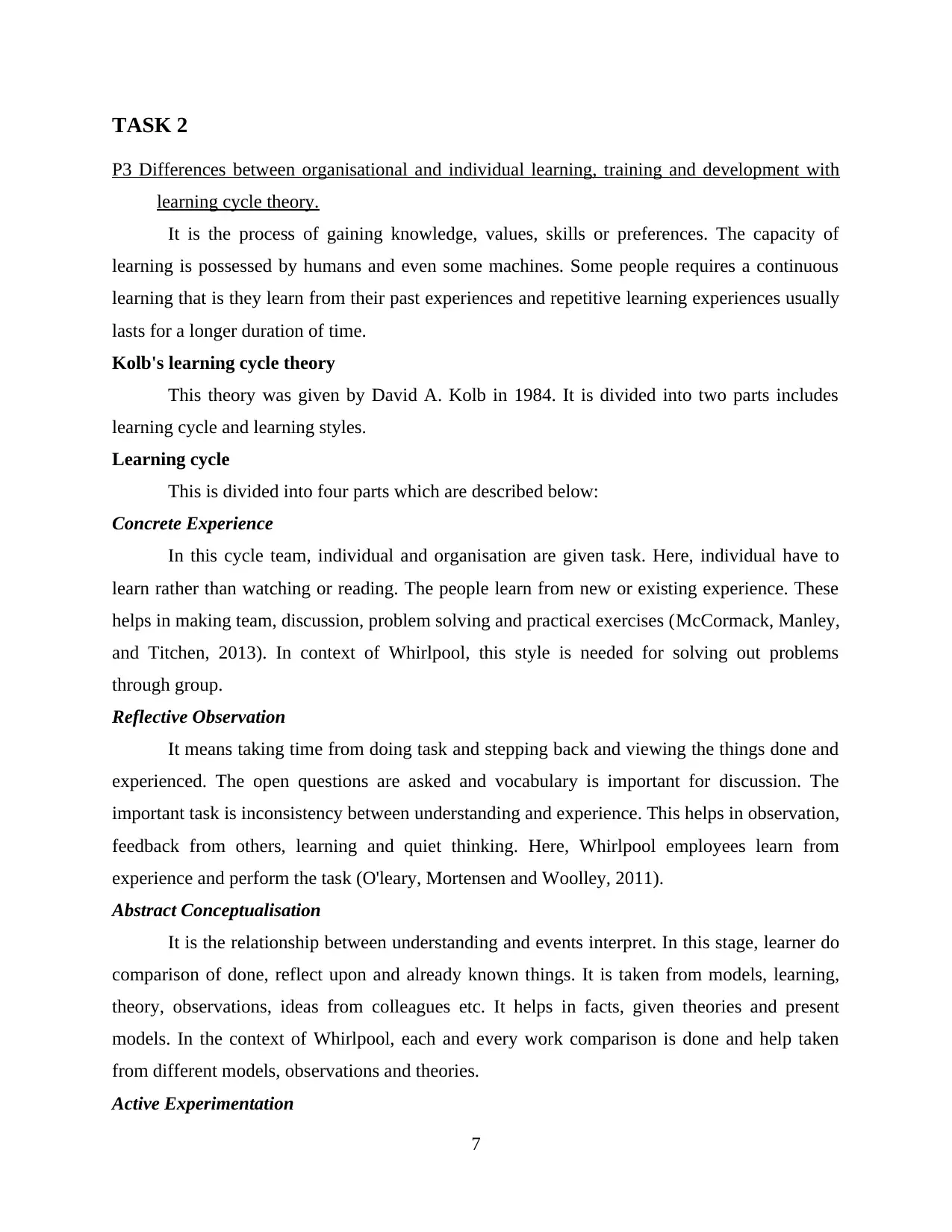
TASK 2
P3 Differences between organisational and individual learning, training and development with
learning cycle theory.
It is the process of gaining knowledge, values, skills or preferences. The capacity of
learning is possessed by humans and even some machines. Some people requires a continuous
learning that is they learn from their past experiences and repetitive learning experiences usually
lasts for a longer duration of time.
Kolb's learning cycle theory
This theory was given by David A. Kolb in 1984. It is divided into two parts includes
learning cycle and learning styles.
Learning cycle
This is divided into four parts which are described below:
Concrete Experience
In this cycle team, individual and organisation are given task. Here, individual have to
learn rather than watching or reading. The people learn from new or existing experience. These
helps in making team, discussion, problem solving and practical exercises (McCormack, Manley,
and Titchen, 2013). In context of Whirlpool, this style is needed for solving out problems
through group.
Reflective Observation
It means taking time from doing task and stepping back and viewing the things done and
experienced. The open questions are asked and vocabulary is important for discussion. The
important task is inconsistency between understanding and experience. This helps in observation,
feedback from others, learning and quiet thinking. Here, Whirlpool employees learn from
experience and perform the task (O'leary, Mortensen and Woolley, 2011).
Abstract Conceptualisation
It is the relationship between understanding and events interpret. In this stage, learner do
comparison of done, reflect upon and already known things. It is taken from models, learning,
theory, observations, ideas from colleagues etc. It helps in facts, given theories and present
models. In the context of Whirlpool, each and every work comparison is done and help taken
from different models, observations and theories.
Active Experimentation
7
P3 Differences between organisational and individual learning, training and development with
learning cycle theory.
It is the process of gaining knowledge, values, skills or preferences. The capacity of
learning is possessed by humans and even some machines. Some people requires a continuous
learning that is they learn from their past experiences and repetitive learning experiences usually
lasts for a longer duration of time.
Kolb's learning cycle theory
This theory was given by David A. Kolb in 1984. It is divided into two parts includes
learning cycle and learning styles.
Learning cycle
This is divided into four parts which are described below:
Concrete Experience
In this cycle team, individual and organisation are given task. Here, individual have to
learn rather than watching or reading. The people learn from new or existing experience. These
helps in making team, discussion, problem solving and practical exercises (McCormack, Manley,
and Titchen, 2013). In context of Whirlpool, this style is needed for solving out problems
through group.
Reflective Observation
It means taking time from doing task and stepping back and viewing the things done and
experienced. The open questions are asked and vocabulary is important for discussion. The
important task is inconsistency between understanding and experience. This helps in observation,
feedback from others, learning and quiet thinking. Here, Whirlpool employees learn from
experience and perform the task (O'leary, Mortensen and Woolley, 2011).
Abstract Conceptualisation
It is the relationship between understanding and events interpret. In this stage, learner do
comparison of done, reflect upon and already known things. It is taken from models, learning,
theory, observations, ideas from colleagues etc. It helps in facts, given theories and present
models. In the context of Whirlpool, each and every work comparison is done and help taken
from different models, observations and theories.
Active Experimentation
7
⊘ This is a preview!⊘
Do you want full access?
Subscribe today to unlock all pages.

Trusted by 1+ million students worldwide
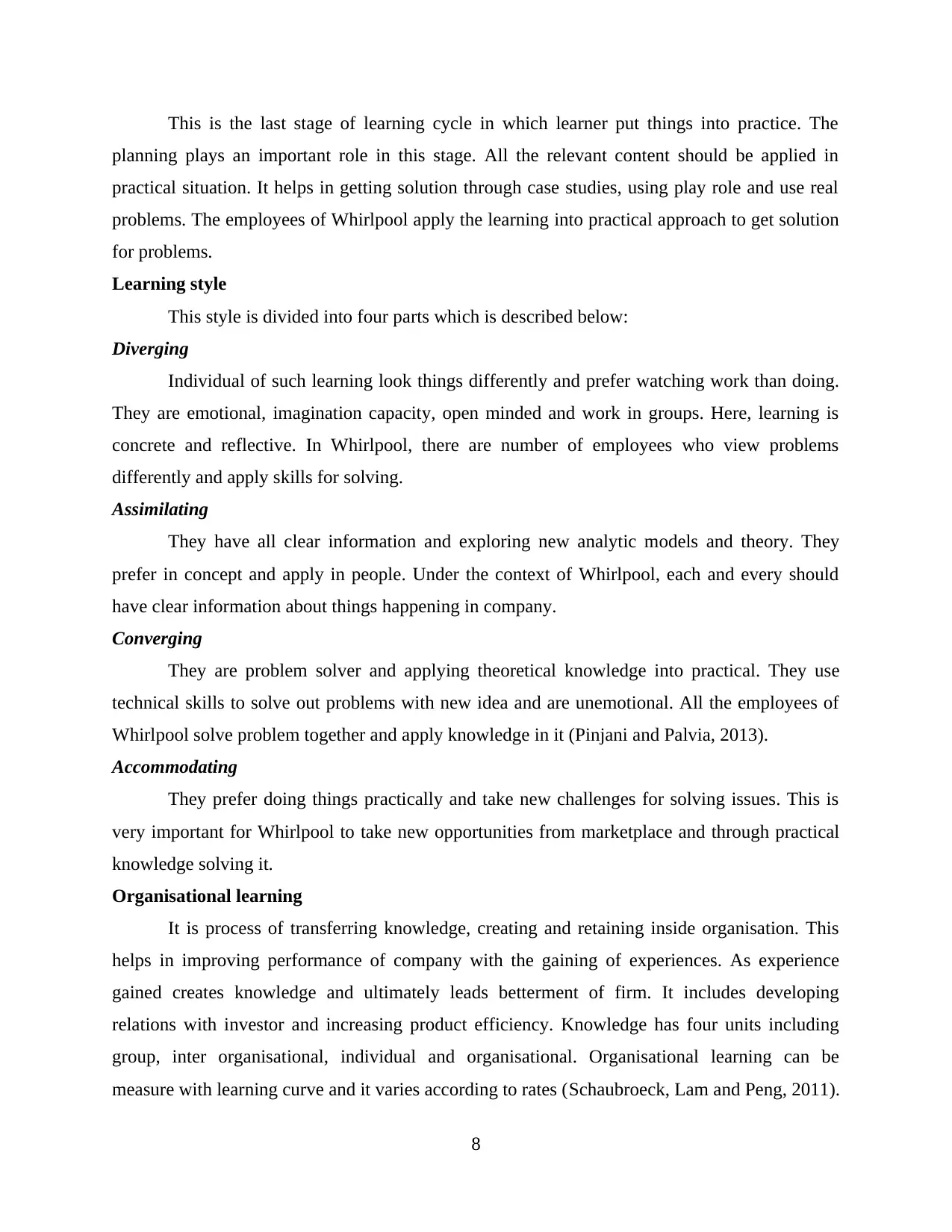
This is the last stage of learning cycle in which learner put things into practice. The
planning plays an important role in this stage. All the relevant content should be applied in
practical situation. It helps in getting solution through case studies, using play role and use real
problems. The employees of Whirlpool apply the learning into practical approach to get solution
for problems.
Learning style
This style is divided into four parts which is described below:
Diverging
Individual of such learning look things differently and prefer watching work than doing.
They are emotional, imagination capacity, open minded and work in groups. Here, learning is
concrete and reflective. In Whirlpool, there are number of employees who view problems
differently and apply skills for solving.
Assimilating
They have all clear information and exploring new analytic models and theory. They
prefer in concept and apply in people. Under the context of Whirlpool, each and every should
have clear information about things happening in company.
Converging
They are problem solver and applying theoretical knowledge into practical. They use
technical skills to solve out problems with new idea and are unemotional. All the employees of
Whirlpool solve problem together and apply knowledge in it (Pinjani and Palvia, 2013).
Accommodating
They prefer doing things practically and take new challenges for solving issues. This is
very important for Whirlpool to take new opportunities from marketplace and through practical
knowledge solving it.
Organisational learning
It is process of transferring knowledge, creating and retaining inside organisation. This
helps in improving performance of company with the gaining of experiences. As experience
gained creates knowledge and ultimately leads betterment of firm. It includes developing
relations with investor and increasing product efficiency. Knowledge has four units including
group, inter organisational, individual and organisational. Organisational learning can be
measure with learning curve and it varies according to rates (Schaubroeck, Lam and Peng, 2011).
8
planning plays an important role in this stage. All the relevant content should be applied in
practical situation. It helps in getting solution through case studies, using play role and use real
problems. The employees of Whirlpool apply the learning into practical approach to get solution
for problems.
Learning style
This style is divided into four parts which is described below:
Diverging
Individual of such learning look things differently and prefer watching work than doing.
They are emotional, imagination capacity, open minded and work in groups. Here, learning is
concrete and reflective. In Whirlpool, there are number of employees who view problems
differently and apply skills for solving.
Assimilating
They have all clear information and exploring new analytic models and theory. They
prefer in concept and apply in people. Under the context of Whirlpool, each and every should
have clear information about things happening in company.
Converging
They are problem solver and applying theoretical knowledge into practical. They use
technical skills to solve out problems with new idea and are unemotional. All the employees of
Whirlpool solve problem together and apply knowledge in it (Pinjani and Palvia, 2013).
Accommodating
They prefer doing things practically and take new challenges for solving issues. This is
very important for Whirlpool to take new opportunities from marketplace and through practical
knowledge solving it.
Organisational learning
It is process of transferring knowledge, creating and retaining inside organisation. This
helps in improving performance of company with the gaining of experiences. As experience
gained creates knowledge and ultimately leads betterment of firm. It includes developing
relations with investor and increasing product efficiency. Knowledge has four units including
group, inter organisational, individual and organisational. Organisational learning can be
measure with learning curve and it varies according to rates (Schaubroeck, Lam and Peng, 2011).
8
Paraphrase This Document
Need a fresh take? Get an instant paraphrase of this document with our AI Paraphraser
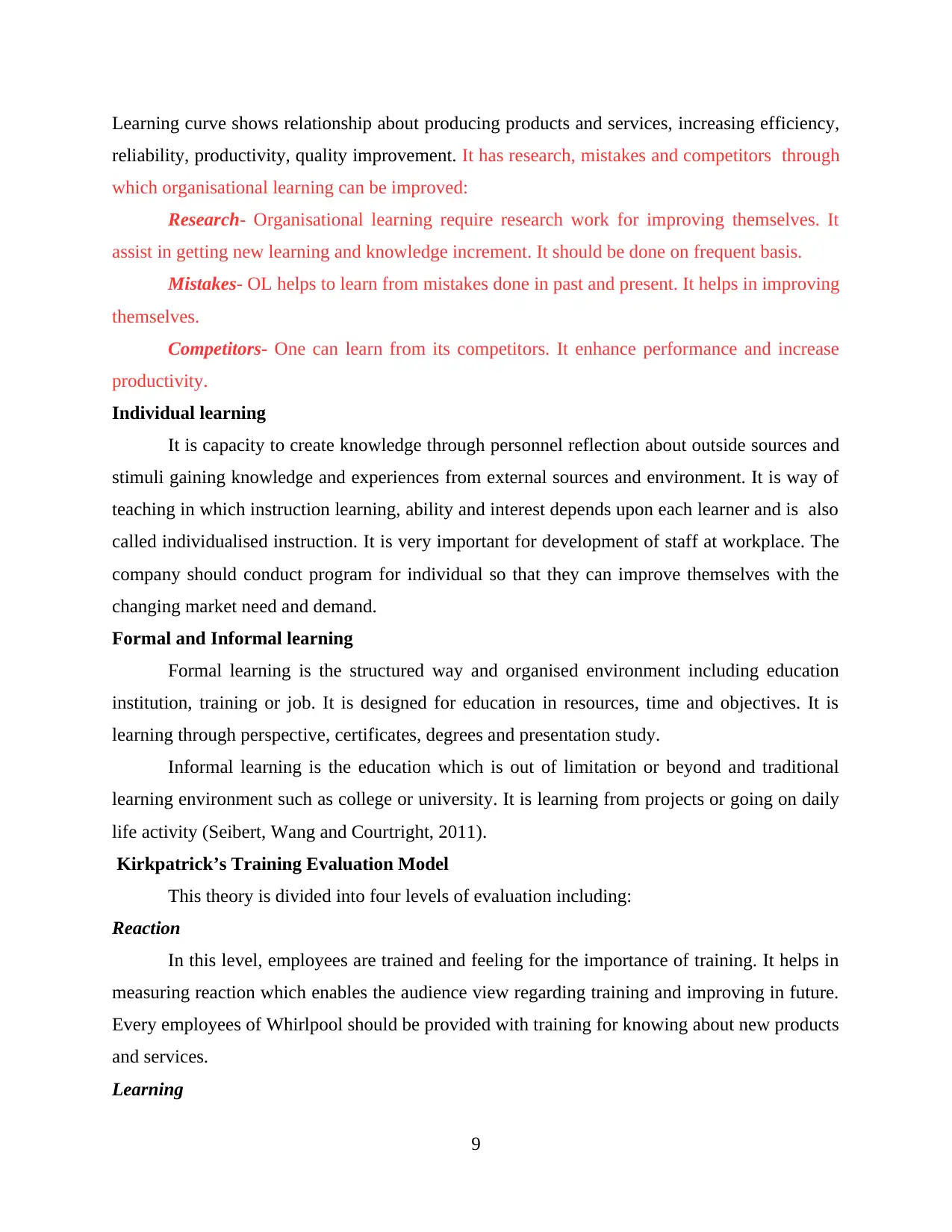
Learning curve shows relationship about producing products and services, increasing efficiency,
reliability, productivity, quality improvement. It has research, mistakes and competitors through
which organisational learning can be improved:
Research- Organisational learning require research work for improving themselves. It
assist in getting new learning and knowledge increment. It should be done on frequent basis.
Mistakes- OL helps to learn from mistakes done in past and present. It helps in improving
themselves.
Competitors- One can learn from its competitors. It enhance performance and increase
productivity.
Individual learning
It is capacity to create knowledge through personnel reflection about outside sources and
stimuli gaining knowledge and experiences from external sources and environment. It is way of
teaching in which instruction learning, ability and interest depends upon each learner and is also
called individualised instruction. It is very important for development of staff at workplace. The
company should conduct program for individual so that they can improve themselves with the
changing market need and demand.
Formal and Informal learning
Formal learning is the structured way and organised environment including education
institution, training or job. It is designed for education in resources, time and objectives. It is
learning through perspective, certificates, degrees and presentation study.
Informal learning is the education which is out of limitation or beyond and traditional
learning environment such as college or university. It is learning from projects or going on daily
life activity (Seibert, Wang and Courtright, 2011).
Kirkpatrick’s Training Evaluation Model
This theory is divided into four levels of evaluation including:
Reaction
In this level, employees are trained and feeling for the importance of training. It helps in
measuring reaction which enables the audience view regarding training and improving in future.
Every employees of Whirlpool should be provided with training for knowing about new products
and services.
Learning
9
reliability, productivity, quality improvement. It has research, mistakes and competitors through
which organisational learning can be improved:
Research- Organisational learning require research work for improving themselves. It
assist in getting new learning and knowledge increment. It should be done on frequent basis.
Mistakes- OL helps to learn from mistakes done in past and present. It helps in improving
themselves.
Competitors- One can learn from its competitors. It enhance performance and increase
productivity.
Individual learning
It is capacity to create knowledge through personnel reflection about outside sources and
stimuli gaining knowledge and experiences from external sources and environment. It is way of
teaching in which instruction learning, ability and interest depends upon each learner and is also
called individualised instruction. It is very important for development of staff at workplace. The
company should conduct program for individual so that they can improve themselves with the
changing market need and demand.
Formal and Informal learning
Formal learning is the structured way and organised environment including education
institution, training or job. It is designed for education in resources, time and objectives. It is
learning through perspective, certificates, degrees and presentation study.
Informal learning is the education which is out of limitation or beyond and traditional
learning environment such as college or university. It is learning from projects or going on daily
life activity (Seibert, Wang and Courtright, 2011).
Kirkpatrick’s Training Evaluation Model
This theory is divided into four levels of evaluation including:
Reaction
In this level, employees are trained and feeling for the importance of training. It helps in
measuring reaction which enables the audience view regarding training and improving in future.
Every employees of Whirlpool should be provided with training for knowing about new products
and services.
Learning
9
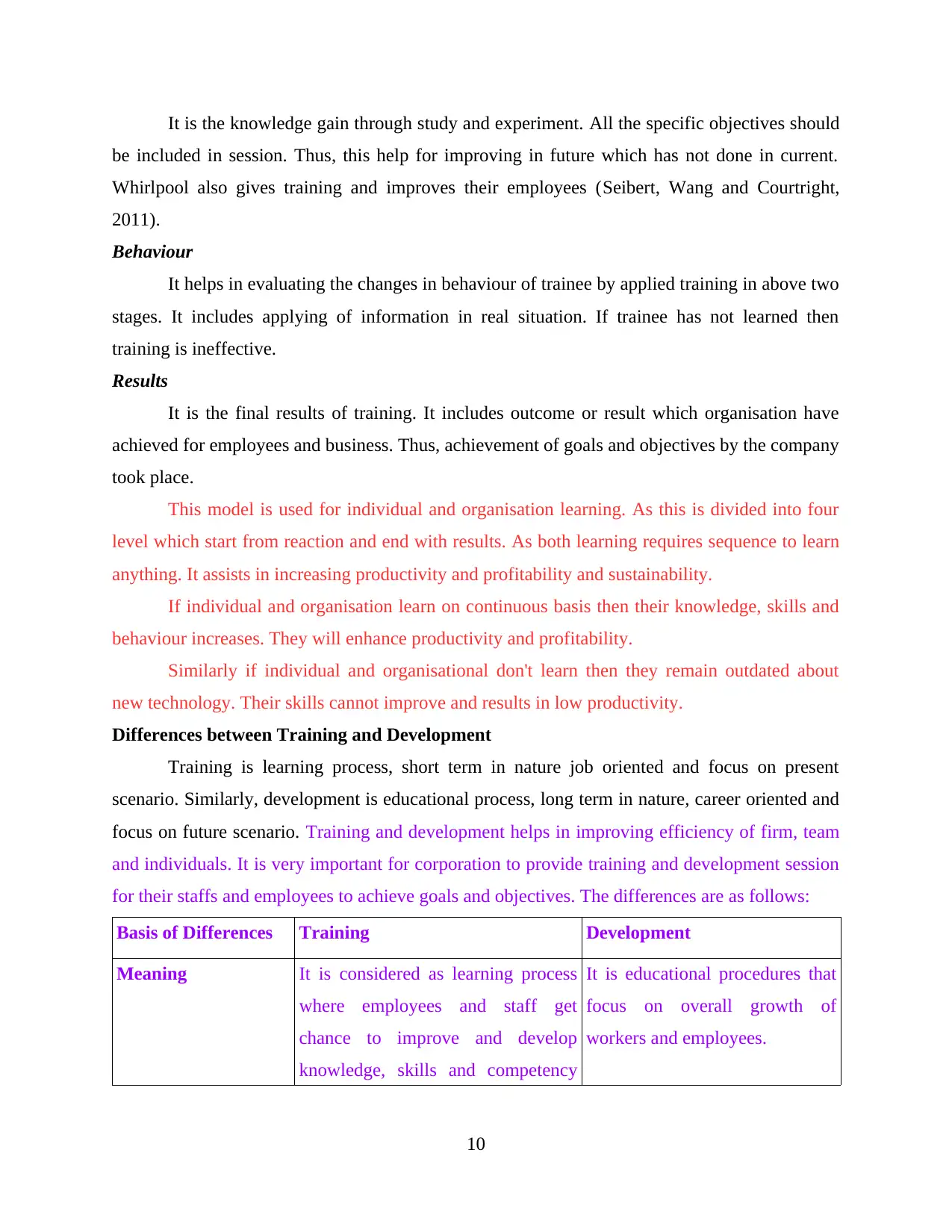
It is the knowledge gain through study and experiment. All the specific objectives should
be included in session. Thus, this help for improving in future which has not done in current.
Whirlpool also gives training and improves their employees (Seibert, Wang and Courtright,
2011).
Behaviour
It helps in evaluating the changes in behaviour of trainee by applied training in above two
stages. It includes applying of information in real situation. If trainee has not learned then
training is ineffective.
Results
It is the final results of training. It includes outcome or result which organisation have
achieved for employees and business. Thus, achievement of goals and objectives by the company
took place.
This model is used for individual and organisation learning. As this is divided into four
level which start from reaction and end with results. As both learning requires sequence to learn
anything. It assists in increasing productivity and profitability and sustainability.
If individual and organisation learn on continuous basis then their knowledge, skills and
behaviour increases. They will enhance productivity and profitability.
Similarly if individual and organisational don't learn then they remain outdated about
new technology. Their skills cannot improve and results in low productivity.
Differences between Training and Development
Training is learning process, short term in nature job oriented and focus on present
scenario. Similarly, development is educational process, long term in nature, career oriented and
focus on future scenario. Training and development helps in improving efficiency of firm, team
and individuals. It is very important for corporation to provide training and development session
for their staffs and employees to achieve goals and objectives. The differences are as follows:
Basis of Differences Training Development
Meaning It is considered as learning process
where employees and staff get
chance to improve and develop
knowledge, skills and competency
It is educational procedures that
focus on overall growth of
workers and employees.
10
be included in session. Thus, this help for improving in future which has not done in current.
Whirlpool also gives training and improves their employees (Seibert, Wang and Courtright,
2011).
Behaviour
It helps in evaluating the changes in behaviour of trainee by applied training in above two
stages. It includes applying of information in real situation. If trainee has not learned then
training is ineffective.
Results
It is the final results of training. It includes outcome or result which organisation have
achieved for employees and business. Thus, achievement of goals and objectives by the company
took place.
This model is used for individual and organisation learning. As this is divided into four
level which start from reaction and end with results. As both learning requires sequence to learn
anything. It assists in increasing productivity and profitability and sustainability.
If individual and organisation learn on continuous basis then their knowledge, skills and
behaviour increases. They will enhance productivity and profitability.
Similarly if individual and organisational don't learn then they remain outdated about
new technology. Their skills cannot improve and results in low productivity.
Differences between Training and Development
Training is learning process, short term in nature job oriented and focus on present
scenario. Similarly, development is educational process, long term in nature, career oriented and
focus on future scenario. Training and development helps in improving efficiency of firm, team
and individuals. It is very important for corporation to provide training and development session
for their staffs and employees to achieve goals and objectives. The differences are as follows:
Basis of Differences Training Development
Meaning It is considered as learning process
where employees and staff get
chance to improve and develop
knowledge, skills and competency
It is educational procedures that
focus on overall growth of
workers and employees.
10
⊘ This is a preview!⊘
Do you want full access?
Subscribe today to unlock all pages.

Trusted by 1+ million students worldwide
1 out of 19
Related Documents
Your All-in-One AI-Powered Toolkit for Academic Success.
+13062052269
info@desklib.com
Available 24*7 on WhatsApp / Email
![[object Object]](/_next/static/media/star-bottom.7253800d.svg)
Unlock your academic potential
Copyright © 2020–2026 A2Z Services. All Rights Reserved. Developed and managed by ZUCOL.





